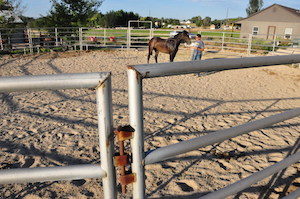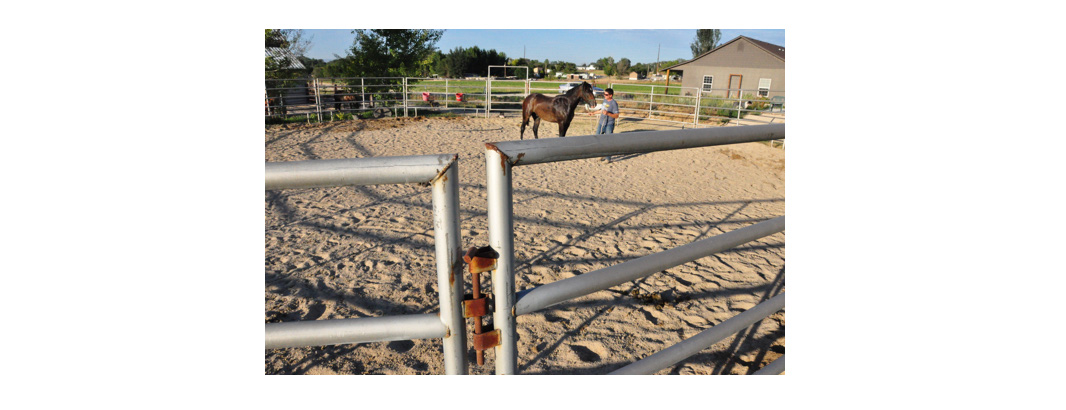Important Considerations when Purchasing this Essential Piece of Equipment
by Alayne Blickle

People often ask me what I think is the most important tool or piece of equipment on our property. They are probably expecting a response like a certain bit, bridle or maybe a tractor. I am quick to reply that our favorite piece of equipment is our round pen.
A good round pen can have many uses such as starting and working young horses and free lunging older horses. We also use it as a place to have inexperienced or young riders start out on horseback and as a small arena for controlled riding or turnout. Because we have a horse motel, we often have guests and their horses here and they use the round pen for turnout. After a long day of trailering, guests like to turn their horses out in the pen so they can move around and have a nice roll in the sand. Most recently we used it to house Bud, the mustang that Matt started as part of the Extreme Mustang Makeover. The Bureau of Land Management requires all potential mustang adoptees to have a strong round pen with six foot fencing.
We purchased our round pen in the mid 1990’s from well-known trainer John Lyons and it is still going strong. We like the six foot tall, welded galvanized pipe (like muffler pipe) panels because they are strong and rust-free. It is a 66 foot in diameter pen; each panel is 12 foot long – sturdy, but lightweight enough that I can move them around by myself. Each panel weighs about 60 pounds. The panels attach with long steel pins making it simple to set up (no tools required) or to take panels apart to adjust the size, something Matt also did with Bud as the 66 foot diameter initially gave him a little too much freedom.
One reason we chose this particular round pen is that the six foot tall height and five-rail design discourages horses from jumping out (another requirement if you are considering adopting a mustang, or will be starting a lot of colts) and adult horse can’t reach their head through it. And, very importantly, the tops of the panels meet squarely (instead of being curved) so that a rambunctious youngster can’t rear up and get a foot stuck between the panels (see above photo).
Locate your round pen for chore efficiency and in a place where it will have good drainage. We placed ours close to the main barn and guest barn since we use it nearly every day. The area we chose had a slight slope for good drainage so surface water doesn’t pool.
For footing, we simply chose the same course “reject sand” we put in our outdoor arena. The coarse, washed sand is less dusty than many of the finer sand products and is less expensive. We put about 20 – 24 yards of sand in initially, then leveled and harrowed it extensively to mix the sand into the native soil. Because the panels are connected with pins instead of clamps we can easily swing open a panel to drive in a tractor for regular harrowing. In a small space like this the footing gets compacted quickly and every few years we need to add another 8-10 yards of footing.
The size and construction of our round pen is exactly right for our needs. It seemed very expensive at purchase, but has been one of the best investments in horse equipment we’ve made. It is big enough to ride in, yet small enough to work a horse at liberty without having to run as much as the horse.
Caution: Avoid hard riding or continuous work in a round pen work. A round pen places a great deal of torque on the inside legs, joints and soft tissues which can result in repetitive injuries.
Get set for winter with Horses for Clean Water at the following FREE event:
REDMOND, WA
Sunday, October 12, 1 – 3 pm
FARM TOUR: Farrel McWhirter Park
Contact Alayne at Alayne@horsesforcleanwater.com or 206-909-0225 to register or for questions.
Originally Published September 2014 Issue

Alayne Blickle, a life-long equestrian and educator, is the creator/director of Horses for Clean Water, an award-winning, nationally acclaimed environmental education program that “wrote the book” on caring for horses and land. Known for her enthusiastic, fun and down-to-earth approach, she is an educator and photojournalist who has worked with horses and livestock owners for over 20 years. Alayne teaches and travels throughout North America and abroad, and also runs Sweet Pepper Ranch, an eco-sensitive guest ranch and horse motel in Southwestern Idaho where she and her husband raise top-notch reining horses and beautiful grass hay. For more information contact Alayne at alayne@horsesforcleanwater.com or 206-909-0225.

